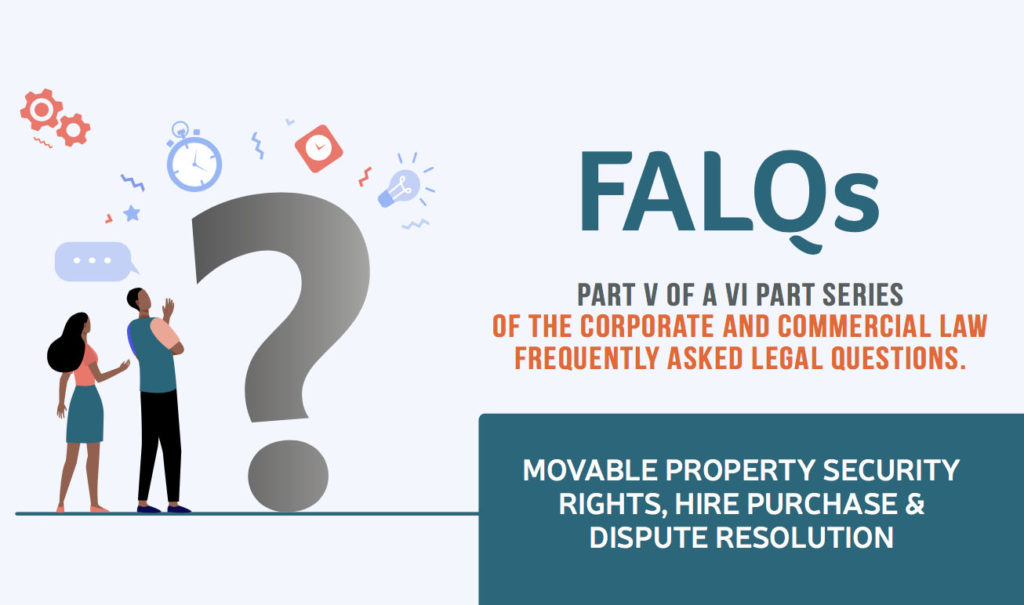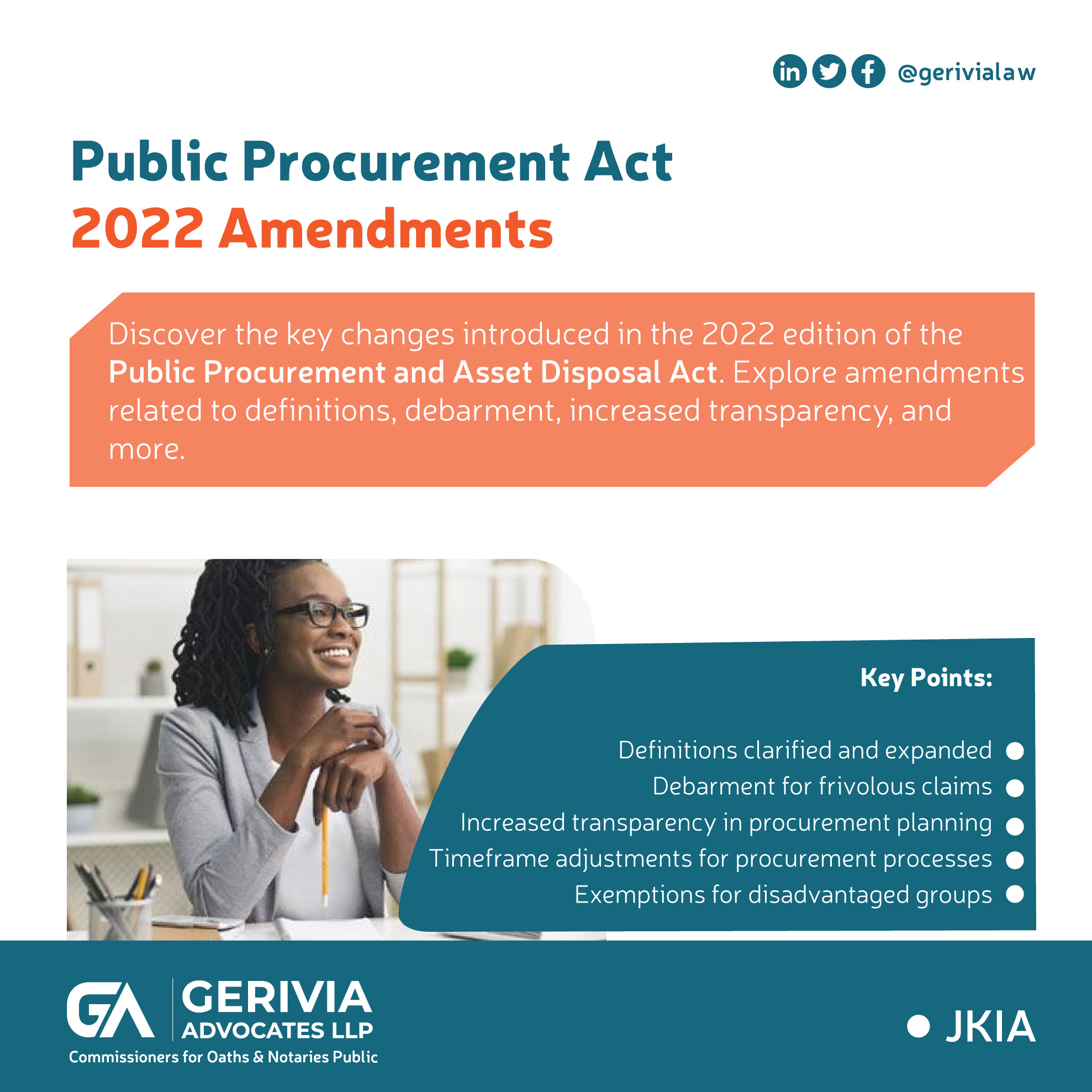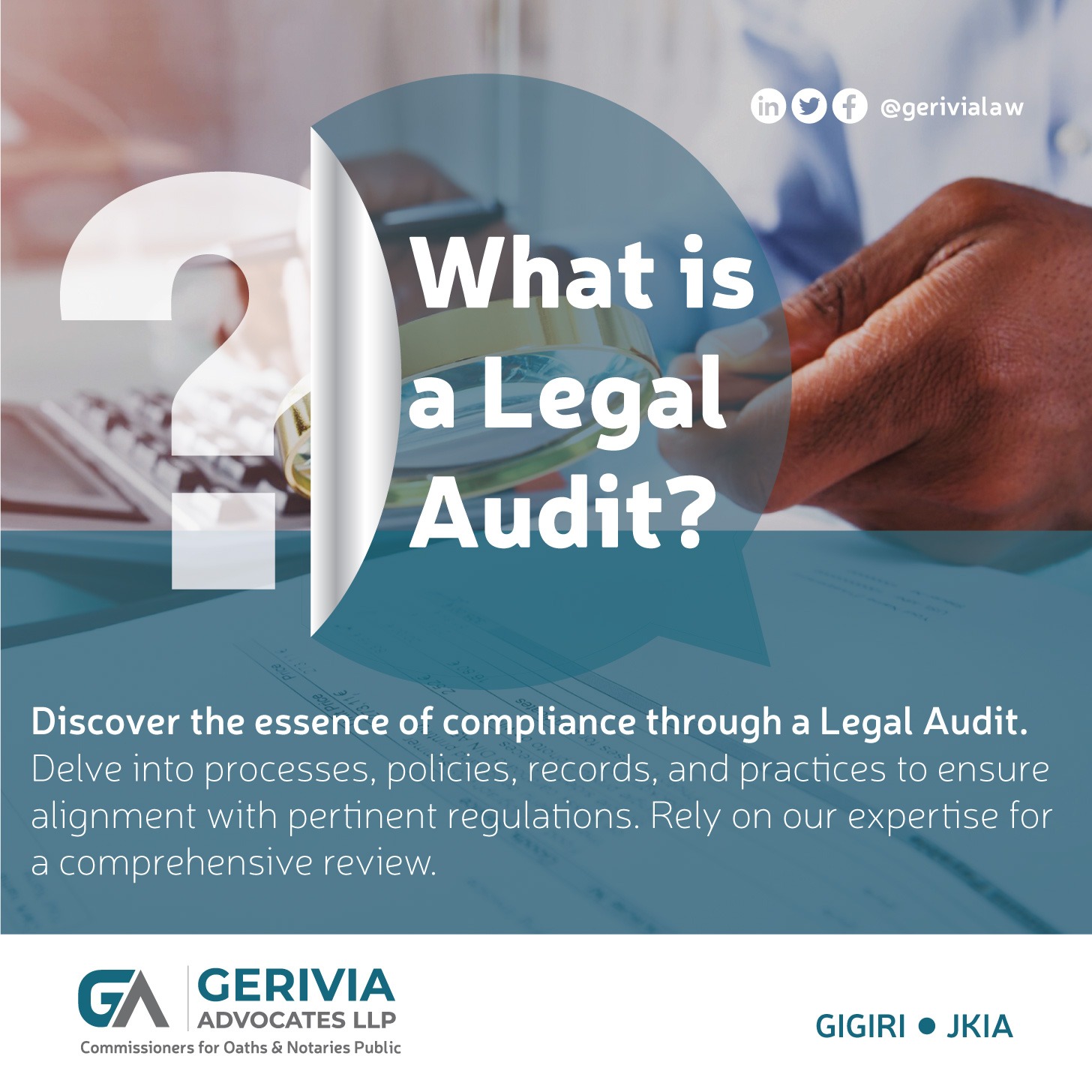- What is a Movable Property Security Right (MPSR)?
- It is a right that is created to allow the use of all types of tangible and intangible assets as security for a loan facility, as opposed to the traditional way of securing a loan through charges and mortgages.
- Which law governs the Movable Property Security Rights?
- It is governed by the Movable Property Security Rights Act No. 13 of 2017 (“the MPSR Act”).
- What are the objects of the Movable Property Security Rights Act No 13 of 2017?
- Promote consistency and certainty in secured financing relating to movable assets;
- Enhance the ability of individuals and entities to access credit using movable assets; and
- To establish the office of the Registrar and registry to facilitate the registration of security rights in movable assets.
- What are some of assets that I can use to secure a loan facility under the Movable Security Property Right?
- For tangible assets, you can use your crops, livestock, books, motor vehicle, etc. as security for your loan.
- For intangible assets, you can use intellectual property rights, receivables, deposit accounts, electronic securities, etc. as security for your loan.
- How is a security right created under MPSR?
- A security right is created through a security agreement.
- The Agreement must be in writing, signed by the grantor and identifies the creditor. It must also describe the secured obligation and describe the collateral.
- Which types of collateral are not applicable under the MPSR Act?
The MPSR Act does not apply to the following:
-
- Security right in book-entry securities under the Central Depositories Act, 2000;
- The creation, lease or transfer of an interest in land, excluding a right to payment that arises in connection with an interest in or a lease of land;
- A security right in a vessel including a mortgage right subject to the Merchant Shipping Act, 2009;
- A security right in an aircraft subject to the Civil Aviation Act, 2013;
- A lien, charge or other interest created by law, except as otherwise provided in the MPSR Act; and
- Security rights in proceeds of collateral if the proceeds constitute a type of asset that is governed by another law.

- How is a Security Right registered?
- First, the creditor and the grantor should enter into a security agreement.
- The agreement must be in writing, signed by the grantor and identifies the creditor. It must also describe the secured obligation and describe the collateral.
- Once parties have written and signed their security agreement, they can proceed to register a notice.
- Registration of a notice ensures that the parties have registered their legal obligations and that the security agreement is enforceable.
- After the initial notice, an applicant can conduct a search to ascertain the particulars of the notice.
- The criteria for conducting a search are by using either the grantor’s identification or the serial number of the collateral.
- Once a person enters a search request and pays the requisite fee, the registry conducts the search and issues a search certificate, which contains the date, and time when the search was performed, all information matching the search requirements criterion exactly or an indication that no registered notice contains information matching the search criterion exactly.
- The fees payable for conducting such a search are indicated on the MPSR Registry Services and Processes which can be downloaded from https://brs.go.ke.
- The resultant search certificate is proof of its contents.
- How do parties enforce a security right?
- Enforcement of a security right by the parties entails either party to the agreement exercising its rights upon default of the other party.
- The parties can exercise their rights either as per Part VI of the MPSR Act, as provided for in the security agreement, or as provided under any other written law.
- What should the secured creditor do in case of non-compliance?
- If there is a default with respect to any obligation, the secured creditor shall serve on the grantor a notification, in writing or in other form agreed between the parties, to pay the money owing or perform and observe the agreement as the case may be.
- The notification should inform the recipient of the following issues:
-
-
- Nature and extent of default;
- If the default consists of non-payment, the actual amount and the time by the end of which payment must be completed;
- If the default consists of the failure to perform or observe any covenant, express or implied in the agreement, the act the grantor must do or desist from doing so as to rectify the default and the time by the end of which the default must have been rectified;
- The consequence that if the default is not rectified within the time specified in the notification, the secured creditor will proceed to exercise any of the remedies available to him; and
- The right of the grantor in respect of certain remedies to apply to the court for relief against these remedies.
-
- What reliefs are available for the secured creditor if the grantor does not comply within the time period indicated in the notification?
The secured creditor may:
-
- Sue the grantor for any payment due and owing under the agreement;
- Appoint a receiver of the movable asset;
- Take possession of the movable asset;
- Sell the movable asset; or
- Pursue any of the remedies under the MPSR Act.
- What is hire purchase?
- Hire purchase is a transaction where goods are purchased and sold in regular installments while the buyer keeps possession of the goods and makes use of them.
- Hire purchase in Kenya is governed by the Hire Purchase Act Cap. 507 of the Laws of Kenya.
- What is the nature of a hire purchase agreement?
- A hire purchase agreement is an agreement for the bailment of goods under which the hirer may buy the goods, or under which the property in the goods will or may pass to the hirer.
- The owner of the goods hires them out for an agreed periodic amount payable in instalments and gives the hirer the option to purchase.
- The property in the goods passes when all the agreed hire purchase instalments have been paid together with a nominal amount payable with the final instalment.
- Should a hire purchase agreement be registered?
- Yes, it should be registered: in the event that the hire purchase agreement is not registered, it is not enforceable by any party to it.
- How does one ensure enforceability of a Hire Purchase Agreement?
- The agreement should be signed by the hirer and/or on behalf of all other parties to the agreement.
- The agreement should contain a statement of:
-
- The hire purchase price and the cash price of the goods to which the agreement relates;
- The amount of each of the instalments by which the hire purchase price is to be paid and the date (or the mode of determining the date) upon which each instalment is payable; and
- A description of the goods sufficient to identify them.
- The agreement should contain a notice in the prescribed form relating to the rights of the hirer which is at least as prominent as the rest of the contents of the agreement.
- A copy of the agreement should be delivered or sent by registered post by the owner to the hirer within 21 days of the date of agreement.
- What provisions in a hire purchase agreement would render it void?
- Provisions restricting the owner’s liability for wrongful entry into premises to re-possess goods;
- Any term that seeks to restrict or exclude the hirer’s right to terminate the agreement; and
- Any term that seeks to increase the hirer’s liability upon termination of the hire purchase agreement.
- What are the implied terms of a hire purchase agreement?
- A condition that the owner will have a right to sell the goods at the time when the property is to pass;
- A warranty that the hirer shall have and enjoy quiet possession of the goods;
- A warranty that the goods will be free from any charge or encumbrance in favor of a 3rd party at the time when the property is to pass;
- Except where the goods are second-hand goods and the agreement contains a statement to that effect, a condition that the goods will be of merchantable quality; and
- A condition that the legal ownership of and title to the goods shall automatically be vested on the hirer upon payment of the hire purchase price in full.
- What are the duties of a hirer under hire purchase agreements?
- Duty to pay the hire purchase instalments;
- Duty to take delivery of the goods;
- Duty to exercise reasonable care of the goods;
- Duty not to remove the goods from Kenya if stipulated so under the agreement; and
- Duty not to re-let or sell the goods.
- What are the rights of the owner under the hire purchase agreement?
- Right to terminate the agreement;
- Right to re-possess the goods; and
- Right to sue for unpaid goods.
- What are some of the ways of resolving commercial disputes?

- Negotiation
- This is the most basic dispute resolution mechanism with parties having autonomy over the process of reaching a mutually acceptable resolution without assistance from 3rd
- Parties have autonomy about the forum, process, 3rd parties involved, and the outcome.
- With negotiation, disputants meet to discuss mutual or opposing interests despite the parties having equal or unequal power to reach a win-win solution.
- The aim of negotiations is to harmonize the interests of the parties concerned amicably.
- Negotiations between parties can lead to mediation in the sense that the need for mediation arises after the conflicting parties have attempted negotiation but have reached a deadlock.
- Mediation
- This is a voluntary, informal, consensual, strictly confidential and non-binding dispute resolution process in which a 3rd party, called a mediator, helps the parties reach a negotiated solution.
- Parties are at liberty to choose a neutral mediator, the process of mediation, and the outcome of mediation.
- The goal of mediation is to help the parties free themselves from the encumbrance of rules and to accept a relationship of mutual respect, trust, and understanding that will enable them meet shared contingencies without the aid of formal prescriptions laid down in advance.
- Conciliation
- This is another method of alternative dispute resolution where a 3rd party, called a conciliator, restores damaged relationships between disputing parties by bringing them together, clarifying perceptions and pointing out misperceptions.
- Conciliation works well in labor disputes.
- The conciliator can propose solutions making parties lose some control over the process.
- Adjudication
- This is an informal, speedy, flexible and inexpensive process where a neutral 3rd party, called the adjudicator, makes a rapid fair decision within disputes arising from contracts.
- It is preferred when there is power imbalance between the disputants and is suitable for construction disputes.
- Arbitration
- This is a dispute resolution mechanism where a neutral party, called an arbitrator, is appointed by the parties or an appointing authority to determine the dispute and give a final and binding decision called an award.
- Arbitration yields enforceable decisions and is backed by judicial framework.
- Some of the challenges associated with arbitration are that it uses the traditional adversarial system in arbitration proceedings which are delayed as both parties take a lot of time presenting their documents and submissions. The cost of arbitration is much more than other alternative dispute resolution methods and therefore does not attract ‘poor’ litigants. The participatory role of the parties is also neglected as the submissions are sometimes made by Advocates.
- One of the advantages of arbitration is that it private and not open to the public unlike litigation which is open to the public.
- Litigation
- If parties do not expressly choose an Alternative Dispute Resolution Method in a transaction or agreement, it is implied that they select litigation to resolve any disputes.
- This is where disputes are litigated before a court of law following the court procedures and methods laid out under various laws, depending on the nature of the matter before the court and the quantum.
- Litigation is a very formal process and often involves Advocates representing the disputants.
- One of the major disadvantages of litigation is that it has numerous processes and steps and might take a very long time to conclude due to the challenges facing access to justice in Kenya and back log of cases.
- It is often used as a dispute resolution mechanism of the last resort, that is, if all the other alternative dispute resolution methods have not borne any fruit.
Compiled by: George Karuthui Kamau, Susan Wairimu Munene, Sylvia Wambui Waiganjo; Francis Kabuchu and Doreen Khizi Kithinji.




